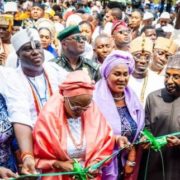Telecom Industry Leaders Demand Urgent Action on Skills Development
Industry stakeholders at the Stakeholders’ Consultative Forum on Skill Gaps in the Telecom Value Chain, organized by the Nigerian Communications Commission (NCC) in Lagos, have called for a more structured and institutional approach to addressing Nigeria’s widening telecom skill gaps.
RELATED: DBI, SBTS begin 50,000-youth nationwide BPO and cybersecurity programme
The forum, themed “Bridging the Telecom Value Chain Skill Gap: Empowering Indigenous Talents for Industry Growth”, highlighted the mismatch between the country’s expanding digital economy and its underdeveloped human capital base.
Strengthening DBI Instead of New Academies
Abraham Durosawo, Vice President of the Nigeria Infrastructure Fund at the Nigeria Sovereign Investment Authority (NSIA), argued that the solution lies in strengthening the Digital Bridge Institute (DBI) rather than establishing a new National Telecom Academy.
“Why do we need a National Telecom Academy when we can strengthen DBI? DBI should be made financially independent, expand its shareholder base, and attract long-term investors who can help build the capacity required for industry growth,” Durosawo said.
He stressed that DBI could become a self-funding institution with the intellectual and policy depth to prepare Nigeria’s telecom workforce and reduce reliance on foreign expertise.
ATCON Proposes Telecom & Digital Infrastructure Skills Council
Tony Izuagbe Emoekpere, President of the Association of Telecommunications Companies of Nigeria (ATCON), described the skill shortage as one of the most pressing challenges across Nigeria’s digital economy.
ALSO READ: Nigeria signs human capital investment partnership agreement for digital skills and 50,000 jobs
“Our industry faces a shortage of skilled professionals in vital areas including RF engineering, fiber planning, cybersecurity, data center operations, and project management,” he said.
ATCON recommended establishing a Telecom & Digital Infrastructure Skills Council to set industry standards and certify talent. Emoekpere stressed that all stakeholders — operators, tower companies, OEMs, and regulators — must align investments to build Nigerian capabilities at scale.
NCC: Indigenous Talent Shortage Threatens Industry Growth
Representing NCC’s Executive Vice Chairman Dr. Aminu Maida, Mr. Edoyemi Ogoh, Director of Technical Standards and Network Integrity, noted that the shortage of indigenous talent poses a serious threat to the sector.
He recalled that liberalization of the telecom industry in 2001 created over 500,000 jobs and spurred economic growth, but current progress is at risk. Studies, including the 2024 ITU assessment, show that while employers demand about 30% advanced digital skills, only 11% of workers possess them.
ALTON: Focus on Retaining Mid-Level Skills
Gbenga Adebayo, Chairman of the Association of Licensed Telecom Operators of Nigeria (ALTON), stressed the importance of mid-level skills.
“These so-called small skills are critical. In four years, I lost 12 skilled technicians in my company to Canada, Germany, the U.S., and the UK. It’s not just about training them, but retaining them with better incentives and social guarantees,” Adebayo said.
He called for a Nigerian Telecom Academy or for DBI to integrate more practical training, with operators sponsoring campuses, offering scholarships, certifications, and job pathways to strengthen retention.
Moving Forward: Industry-Focused, Inclusive Training
Stakeholders concluded that Nigeria must accelerate human capital development in telecoms by strengthening institutions like DBI, aligning industry needs with training programs, and providing incentives to retain talent.
The forum emphasized that addressing Nigeria’s telecom skill gaps is central to sustaining growth, reducing dependence on foreign expertise, and ensuring the country’s competitiveness in the global digital economy.






























